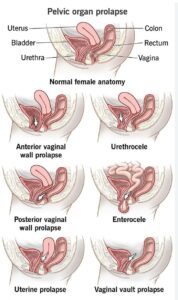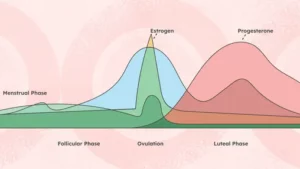Erb’s Palsy, a type of Brachial Plexus Birth Palsy (BPBP), is a condition that affects a newborn’s shoulder and arm, often resulting from complications during birth. The brachial plexus, a network of nerves near the shoulder, controls movement and sensation in the arm. Injury to these nerves can lead to weakness, loss of movement, and, in some cases, permanent damage. However, with early intervention, most infants experience significant improvements. At My French Physio, we prioritize early and comprehensive care to help babies with Erb’s Palsy achieve the best possible outcomes. Here’s what parents need to know.
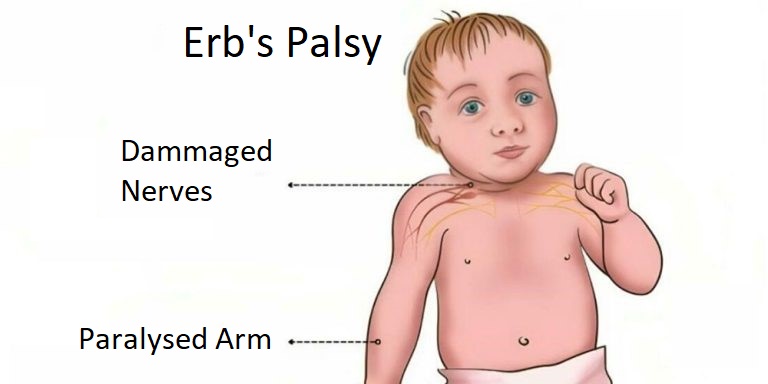
Early Management of Erb Palsy: The First Three Months
For babies with Erb’s Palsy, prompt diagnosis and the right early interventions are key. In many cases, gentle and guided rehabilitation over the first few months encourages natural healing and functional recovery. Early signs of Erb’s Palsy include a weak or limp arm, poor reflexes, and limited shoulder or elbow movement on the affected side.
Initial Treatment Plan for Erb Palsy:
- Immobilization: In the first few weeks, a short period of immobilization may be recommended to support healing, reduce pain, and allow for nerve recovery.
- Therapeutic Exercises: After immobilization, functional rehabilitation begins. Gentle, targeted exercises improve range of motion, maintain joint flexibility, and help strengthen muscles. Our physiotherapists focus particularly on shoulder and elbow movement to prevent stiffness or joint imbalance, which is common in these cases.
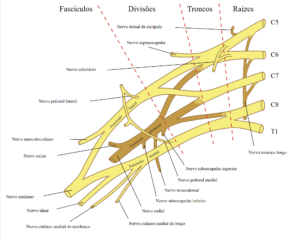
Monitoring Recovery Milestones for Erb Palsy
The course of recovery varies by baby. By understanding your child’s unique needs, we can create a tailored plan and closely monitor progress. The healthy side give us a comparison point. However, Erb Palsy tend to also slow down the general motor development of the baby and specific stimulation exercises are necessary to limit the accumulation of motor delays.
Recovery Timeline and Key Milestones for Erb Palsy:
- First Month: In many babies, simple nerve strain will recover quickly, often within the first few weeks. For these infants, ongoing treatment might not be necessary, though regular check-ups can be helpful.
- 1 to 3 Months: If the baby’s biceps muscle shows strength improvement by the 3-month mark, their prognosis is generally positive, and functional recovery of the arm continues with therapy and gentle exercises.
- When to Consider Surgery: If the baby has not shown significant improvement in arm movement by 3 months, especially in cases of more extensive nerve damage, a specialized surgical consult may be recommended. Our team works with trusted pediatric specialists to provide expert surgical guidance if needed.
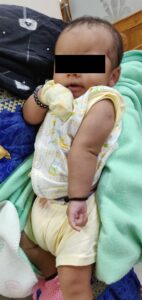
Treatment Approaches for Erb Palsy Beyond Three Months
Some children will need ongoing therapy to support nerve regeneration and muscle development, especially if the biceps muscle is slow to recover. For others, surgical intervention may be needed, typically within the 3 to 6-month window, to improve long-term arm function.
Therapy and Treatment Options After Three Months:
- Continued Physiotherapy: Regular sessions focus on strengthening the shoulder and arm, maintaining joint flexibility, and preventing muscle contractures. Special attention is paid to balancing the shoulder joint to avoid rotational issues.
- Surgical Options: In some cases, surgical repair of the nerves can aid recovery. The goal of surgery is to encourage better arm function and reduce the likelihood of permanent limitations. At My French Physio, we work closely with your pediatric surgeon and provide follow-up physiotherapy to support post-surgery recovery.
How My French Physio Can Help Baby with Erb Palsy?
At My French Physio, we bring extensive experience in treating Erb’s Palsy, using our hands-on, holistic approach to maximize recovery potential in babies with BPBP. We understand that caring for a newborn with Erb’s Palsy can feel overwhelming, and our experienced physiotherapists are here to support both you and your baby every step of the way.
Through regular evaluations and carefully designed therapy sessions, our aim is to enhance your baby’s movement, encourage nerve regeneration, promote good motor development and support your family throughout the treatment journey.
If you have concerns about your child’s recovery or need guidance, please reach out to My French Physio. Together, we’ll create a personalized path to support your child’s growth and health.

